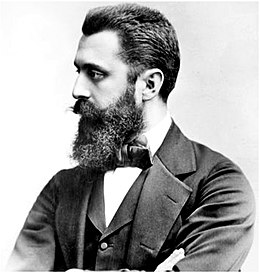
Back أنواع الصهيونية Arabic Sionizmin növləri Azerbaijani Richtungen des Zionismus German זרמים בציונות HE صہیونیت کی اقسام Urdu
This article has multiple issues. Please help improve it or discuss these issues on the talk page. (Learn how and when to remove these template messages)
|

The common definition of Zionism was principally the endorsement of the Jewish people to establish a Jewish national home in Palestine,[1][failed verification] secondarily the claim that due to a lack of self-determination, this territory must be re-established as a Jewish state. Historically, the establishment of a Jewish state has been understood in the Zionist mainstream as establishing and maintaining a Jewish majority.[2] Zionism was produced by various philosophers representing different approaches concerning the objective and path that Zionism should follow. A "Zionist consensus" commonly refers to an ideological umbrella typically attributed to two main factors: a shared tragic history (such as the Holocaust), and the common threat posed by Israel's neighboring enemies.[3][4]
- ^ Berlin, Adele (2011). The Oxford Dictionary of the Jewish Religion. Oxford University Press. p. 813. ISBN 978-0-19-973004-9.
- ^ Yosef Gorny, Zionism and the Arabs, 1882–1948: A Study of Ideology, Oxford 1987
- ^ Gutmann, Emanuel (1988). "The Politics of the Second Generation". In Chelkowski, Peter J.; Pranger, Robert J. (eds.). Ideology and Power in the Middle East. Duke University Press. p. 305. doi:10.1515/9780822381501-014. ISBN 978-0-8223-8150-1.
- ^ Hagit, Lavsky (2002). New Beginnings: Holocaust Survivors in Bergen-Belsen and the British Zone in Germany, 1945-1950. Wayne State University Press. p. 222. ISBN 978-0814330098.
© MMXXIII Rich X Search. We shall prevail. All rights reserved. Rich X Search